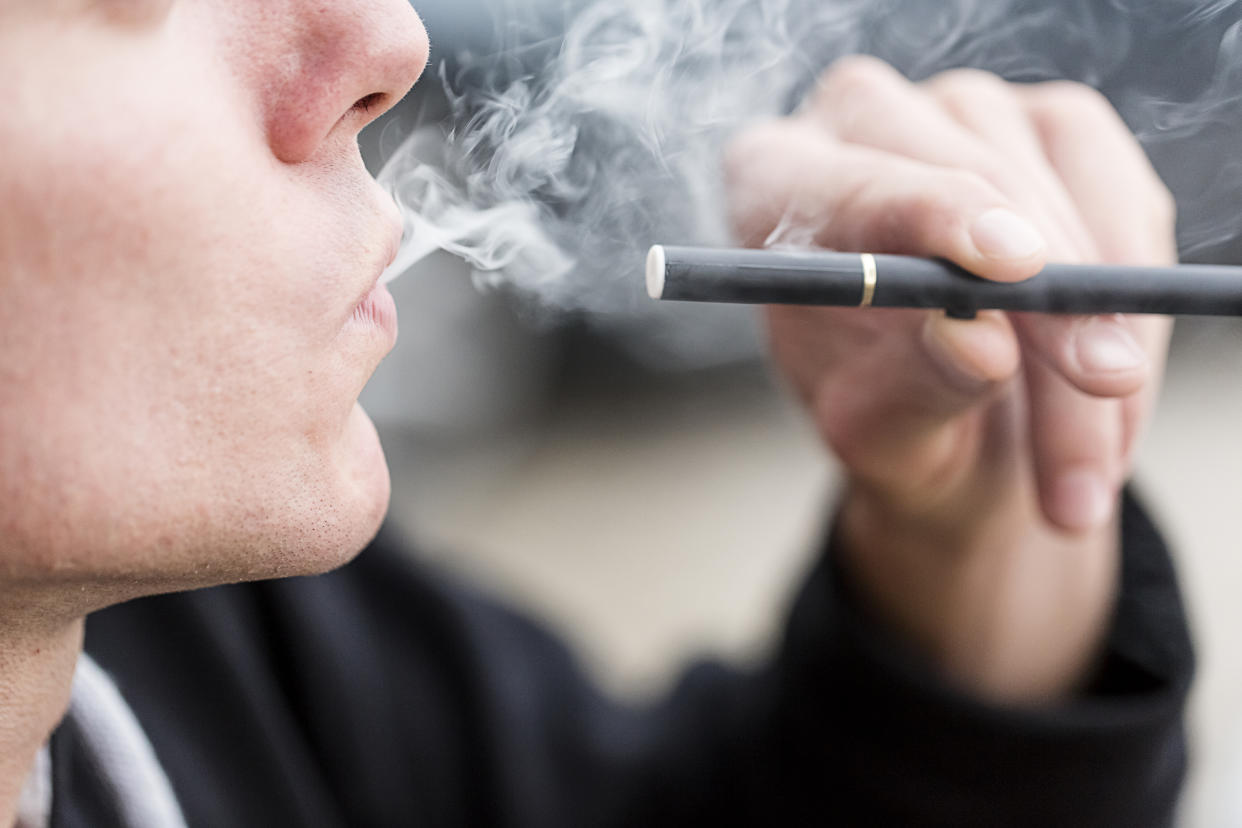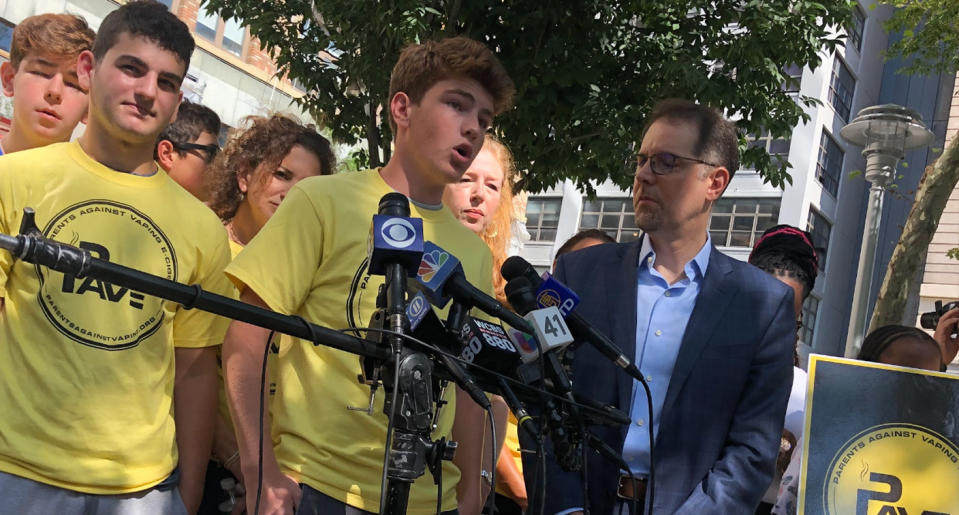Mom of teen with vaping addiction warns parents about the dangers of e-cigarettes: 'It's stealth by design'

At just 14 years old, Phillip Fuhrman started vaping. Toward the end of eighth grade, Phillip went over to the house of a friend, who had the popular e-cigarette, Juul. “I just tried it,” Phillip, now 16, tells Yahoo Lifestyle. “I tried it because they were doing it. I started with the mint flavor and liked it because it felt cool in my throat. It didn’t really burn or hurt.”
Phillip eventually started buying Juul on his own on eBay, asking the doorman in his family’s New York City apartment building to hold the package so he could pick it up before his parents did. He later moved on to buying it at stores, noting how “easy” it was. “Not many places would actually check your ID,” he says. Or else Phillip and his friends would slip the guy at the counter $5 to let them buy it.
Video: Vape Smoke Exposure Among Teens Grow
At first, Phillip’s mom, Dorian Fuhrman, didn’t suspect anything. She did notice that her son smelled slightly sweet. Was he using a new shampoo? Did he have a girlfriend? she wondered. She found out later she was smelling the flavors of Juul.
But then Phillip started to experience serious mood swings. “When you have teenagers, they are so moody anyway and it’s such a difficult time for them,” Dorian tells Yahoo Lifestyle. However, “it was darker and more intense. He had a quick temper, trouble sleeping, and night sweats.”

She also noticed that her son was drinking a ton of water, a sign, she later learned, of the chemical propylene glycol in e-cigarettes pulling moisture from the mouth and nose.
Dorian watched as her “funny, outgoing kid” starting snapping at everyone around him. Even Phillip couldn’t deny the changes in himself. “I noticed I’d have a short temper and get angry very often,” he shares. “I think I sort of downplayed it in my mind — ‘It’s not because of this [vaping]’ — because I wanted to keep doing it.”
The mom eventually found a flash drive-like device (“it’s stealth by design,” she says) in her son’s pocket, which turned out to be a Juul vape, the popular nicotine delivery system.
“That obviously started to raise some red flags,” she says, “but I still did not know what it was.” So Dorian and another mom friend, whose son went to school with Phillip, started to do some research on vaping.
For Phillip, having his mom take away his Juul, was when he acknowledged his addiction. “The first time my mom found it and took it away from me — I went a few days without doing it and I first noticed how dependent I was on it,” he says.
His other wakeup call came when the teen, who had been a junior lifeguard and avid tennis player, tried out for basketball at school and found himself completely winded.

For Dorian, the tipping point arrived when Phillip came home from school one day and mentioned that there had been a mental health and anti-addiction talk. Phillip said that a representative from Juul Labs showed up to speak to the teens — without the knowledge of teachers, administrators, or parents — and told them the product was “totally safe.”
“And he said [the teens] shouldn’t be worried about it because it would soon get FDA approval,” says Dorian. (Juul is not FDA-approved and the U.S. Federal Trade Commission is currently investigating whether Juul Lab’s marketing practices have targeted minors, according to the Wall Street Journal.)
Disturbed by a Juul representative telling teens that e-cigarettes are safe — countering the Centers for Disease Control and Prevention, which explicitly says e-cigarettes are “unsafe” for kids, teens, and young adults — Dorian tried to find an anti-vaping organization similar to Mothers Against Drunk Driving. But there wasn’t one.
“So we decided to start our own organization,” Dorian says. The grassroots organization, PAVe (Parents Against Vaping E-Cigarettes) was founded by Dorian, moms Dina Alessi and Meredith Berkman, and their teen sons to educate parents and teens about vaping and advocate for legislative change.
The organization says that vaping is “the most serious adolescent public-health crisis our country has faced in decades.” In fact, high school students using e-cigarettes went up 78 percent in 2017-2018, according to the CDC. One in five high school students and one in 20 middle schoolers use e-cigarettes.

When e-cigarettes first came out, they were hailed as a safe alternative to smoking because they lack tar and other harmful gasses found in cigarettes. But several reports on teens suffering from severe lung damage and seizures after using the products have shed light on the dangers.
The problem is that the nicotine in e-cigarettes is just as addictive as the one found in regular cigarettes, according to the Office of the U.S. Surgeon General. Vapes also contain ultrafine particles that are inhaled deep into the lungs, as well as the chemical diacetyl, a flavoring that has been linked to lung disease, according to the U.S. Surgeon General and the U.S. Department of Labor Occupational Safety and Health Administration.
Along with causing serious health-related issues, nicotine also affects developing teen brains, increasing the risk of mood disorders and other addictions, and changes how synapses in the brain are formed, affecting attention and learning, according to the U.S. Department of Health and Human Services.
Dorian and Phillip have shared their story publicly to raise awareness of these risks. In January 2019, Phillip also testified at the New York City Council Committee on Health hearing on banning flavored e-cigarettes, which are “hooking the kids,” says Dorian.
To help empower other moms and dads, PAVe has launched a campaign, “Back to School, Not Back to Juul,” that includes a toolkit for parents, including educational materials to share with school principals and school boards.
“The most important message is to stay away” from e-cigarettes “and not do it,” urges Dorian.
Read more from Yahoo Lifestyle:
FDA links vaping to 127 seizures — expert says e-cigarettes can 'alter' teens' brains
CDC warns of 'alarming' strain of antibiotic-resistant Salmonella: What you need to know
Sesame allergies more common than previously thought, says new study
Follow us on Instagram, Facebook and Twitter for nonstop inspiration delivered fresh to your feed, every day.

